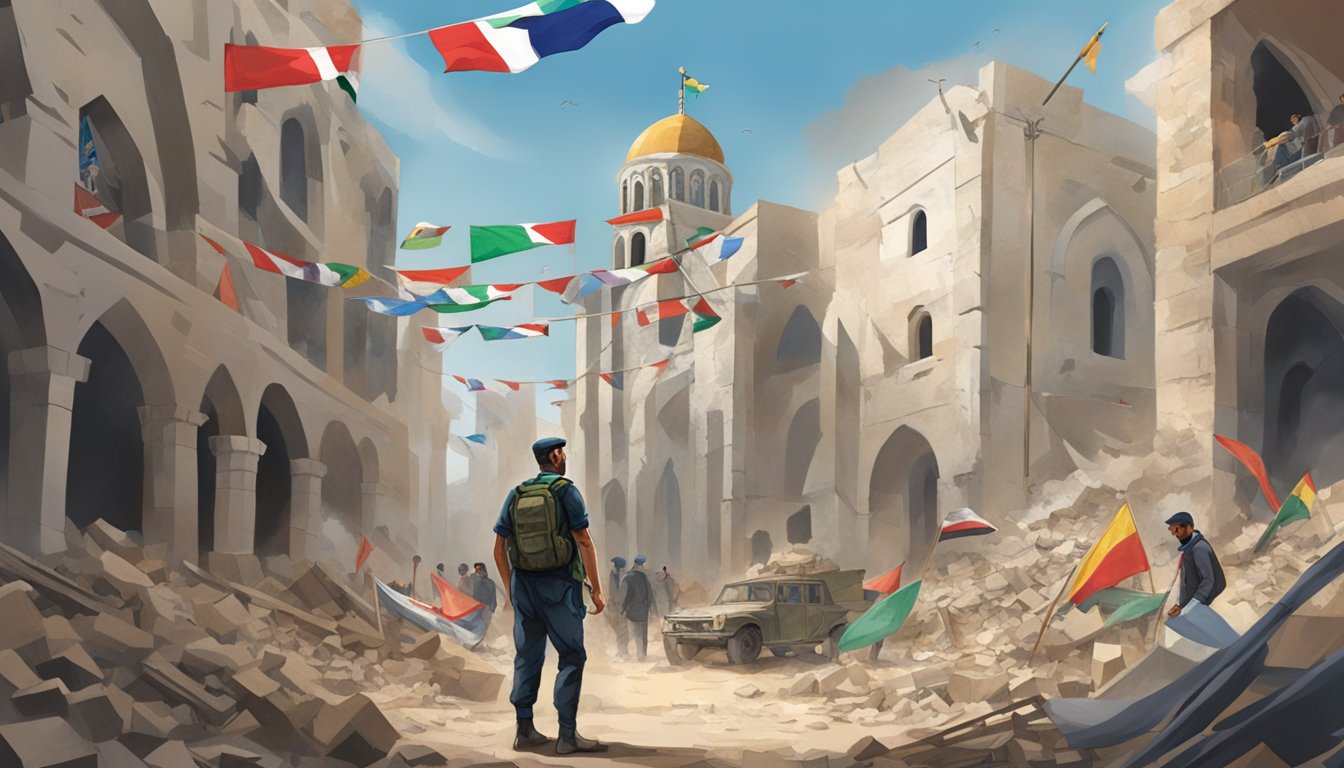Don’t Miss Out On This Unique Astrological Opportunity
Are you tired of spinning your wheels and getting nowhere? Simply put, you’re out of sync: you’re out of alignment with your astral configuration.
But: there’s a kind of map that can help you reclaim your alignment. Think of it as your own personal blueprint to success and happiness: a blueprint that will help you live your most amazing life.
Get started here.
In the heart of Gaza, the Christian community struggles to survive as numbers dwindle under the weight of escalating costs, ruined homes, and constant threats of violence and emigration.
With only about 700 Christians remaining, the ramifications of ongoing conflict have deepened, rendering life increasingly precarious.
Fadi’s Journey Through Chaos
“Fadi” is a name chosen to shield his identity, a reminder of the multilayered political and social challenges faced by those in wartime Gaza.
Every day, he navigates treacherous streets, acutely aware of the surveillance drones buzzing overhead, their ominous sound mingling with the jarring blasts of explosions nearby.
This oppressive atmosphere disrupts the sleep of Fadi and fellow members of the Holy Family Catholic Church, creating a daily struggle just to find rest.
Clad in threadbare clothes salvaged from his destroyed apartment, Fadi embarks on a lengthy and hazardous trek to work.
With gasoline prices soaring to over $250 a gallon, walking has become his only option.
He recounts the perils of the streets, where strangers frequently halt passersby to demand money or mobile phones.
Meanwhile, the Israeli Defense Forces (IDF) have reduced their warnings about impending airstrikes, heightening Fadi’s anxiety over the unpredictability of missile strikes.
Having lost the home he painstakingly built, Fadi now grapples with intense grief and the feeling that his dreams have been obliterated.
Once, he derived pleasure from simple joys—sipping coffee on the Mediterranean shore—yet now that beloved place is buried beneath rubble and debris.
For over a year, frustration has consumed him, with joy becoming a distant memory since war engulfed the region.
The Struggles of Survival
In early October, renewed IDF operations aimed at northern Gaza further escalated the violence, coinciding with a resurgence of Hamas forces.
This surge in bombings led to catastrophic incidents, including the targeting of a school sheltering displaced families, a decision that stirred outrage given the lack of verified threats in that vicinity.
As makeshift ambulances carried the wounded to nearby Al-Ahli Arab Hospital, close to Holy Family, Fadi witnessed the staggering toll on the local population.
Recently, northern Gaza has seen a mass migration, with more than 130,000 Palestinians fleeing south towards Gaza City.
In this desperate climate, Fadi and many others have taken refuge in the Holy Family and the Greek Orthodox Church of St. Porphyrius, as the community fights for its survival.
Fadi is committed to protecting the church, emphasizing their role as guardians.
Abandoning the church could invite looting or attacks, a risk they cannot afford to take.
While international laws safeguard religious sites, those protections fade when such sites are viewed as military assets.
This year alone, the IDF has damaged numerous mosques in Gaza, linking them to militant activity; similarly, Holy Family has also sustained damage from nearby strikes.
The Christian population in Gaza has seen a dramatic decline.
An Argentinian priest serving at Holy Family noted that the community, once numbering 1,071 at the conflict’s onset, has lost approximately 30 percent of its members to casualties and emigration.
The paths to escape, previously available for those with resources, are now largely obstructed by IDF control over key border crossings.
Life Within the Church
Currently, Fadi and other Christians reside within one of Gaza City’s two churches.
Since the violent upheaval that began on October 7, their lives revolve around a stark routine.
Families share classrooms in the Latin Patriarchate school, creating makeshift living spaces.
While children attend classes held in repurposed wooden structures, daily prayers and masses take place amidst the ruins of their once-vibrant community.
Food and medical supplies remain scarce, with aid efforts struggling to reach those in need.
Support from Ismaili Muslims and global philanthropy has provided some relief, offering essential resources to help sustain the displaced families.
Despite these challenges, the community holds onto hope, finding solace in faith and the resilience of their shared bonds.
The church organizes meals twice a week for displaced families, but many rely on scant supplies they gather themselves, with canned goods serving as their mainstay.
Basic necessities have skyrocketed in price: meat surpasses $50 a pound and coffee is around $25 for just half a pound.
Consequently, numerous families find themselves unable to afford fresh produce.
A recent delivery of fruits and vegetables briefly lifted spirits among the weary residents, serving as a rare moment of joy in the midst of turmoil.
In a testament to resilience, the church has taken initiatives to improve living conditions; they have acquired washing machines and solar panels to provide limited electricity, easing the burdens of displaced families.
With around 400 individuals sharing the facilities, access to bathing requires creativity, as residents heat water over wood fires.
Although basic medical supplies are increasingly hard to find, Fadi remains aware that their situation is less dire than that of others still caught in the chaos.
The living conditions in areas like Jabalia starkly contrast with theirs, where stepping outside can be a perilous endeavor.
Source: Christianitytoday



